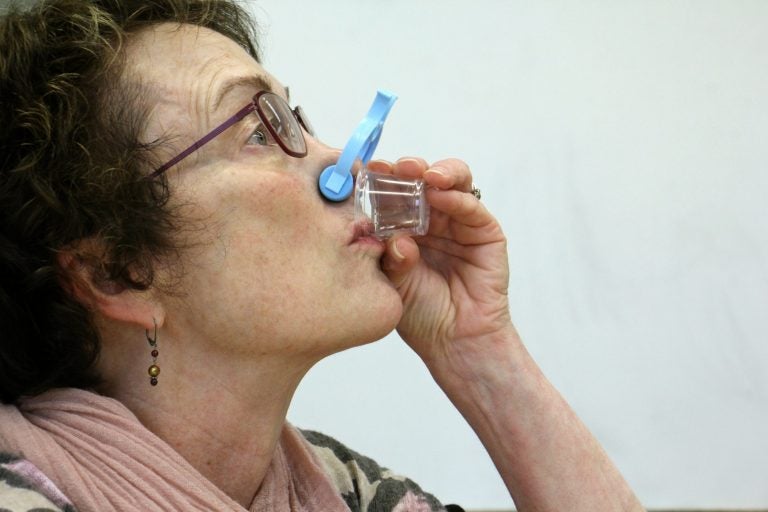Same genes, different tastes
Researchers say environmental factors could explain why some identical twins taste things differently
Listen 05:38
Physiological psychologist Leslie Stein tips back a sip of PTC, a chemical cousin to a compound found in Brussels sprouts. Stein finds the flavor unpleasant, while others find it intollerably bitter, and to some its taste is neutral. (Emma Lee/WHYY)
Every August, Dr. Danielle Reed drives from her lab in Philadelphia, Pennsylvania to Twinsburg, Ohio for the annual Twins Days Festival.
Most of the thousands of attendees are there for a weekend of twin bonding. But Reed — a geneticist who studies smell and taste at Philadelphia’s Monell Chemical Senses Center — has another goal: research.
“Twins are really an experiment of nature,” she said. “Some twins are genetically identical, so that their DNA is the same in all cells in their body, whereas other twins are not genetically identical.”
Comparing identical and fraternal twins gives scientists clues as to which tastes are determined mostly by genetics, and which ones are shaped by environment. So every year, Reed, along with a group of research assistants, conducts tests at the twins extravaganza, to try and determine which tastes are most heavily determined by genetics.
“Our twin studies show that taste is a matter of biology rather than a matter of opinion,” Reed said. “In other words, we show that taste perception is determined in part by our inborn genotype rather than solely by our experience.”
For example, past studies based on these twin taste tests have demonstrated that perceptions of bitterness and saltiness are determined in part by genotype. Usually, identical twins perceive genetically determined flavors in the same way — but sometimes, Reed says, they encounter something unusual.
“Every now and then we find a twin pair that are genetically identical, but they’re dissimilar,” she said, “and this puzzles us because we really don’t understand why that is.”
But Reed has a theory for why it could be — epigenetics, which is the study of changes in gene functioning that are unrelated to changes in the underlying DNA.
Epigenetics is still an emerging field. Research has found that environmental factors have the ability to switch certain genes — for example, ones related to taste — on or off. As a result, traits change without changing genotype.
“Epigenetics is sort of like writing in pencil, whereas genetics is really writing in pen,” Reed said. “You might have a recipe in a book written in ink, but then people come in and they write cooking notes in pencil.”
Those changes don’t happen to the genes themselves, but rather on their surface, according to Shelley Berger, who directs the the Epigenetics Institute at the University of Pennsylvania.
“Epi literally means on top of, in Greek,” Berger said. “So these are changes that occur on top of the DNA.”
Berger says those changes have to do with small chemical groups that attach to the DNA, or to proteins that bind to the DNA, and change the way it behaves. The composition of those groups, and where on the DNA they’re arranged, can change depending on environmental factors.
Scientists have identified several variables that affect the epigenome, including alcohol, diet, stress and smoking — many of which, Berger says, scientists have linked to epigenetic changes resulting in cancer.
Identical twins offer special insight into what’s causing those changes, and which genes are affected. One famous example, Berger says, are the advice columnists Pauline Phillips, better known as “Dear Abby,” and Eppie Lederer, also known as Ann Landers, who were identical twins.
“As they aged, they developed completely different diseases,” Berger said. “One died of cancer, the other died of Alzheimer’s, 11 years apart. So you could then say that something was different in the way they interacted with the environment that led to these very different diseases.”
Cases like these have pushed researchers studying everything from cancer to Alzheimer’s to look more closely at epigenetics — and at twins.
Reed says there are big questions we might answer by studying both.
“I find it very fascinating when people are genetically identical, but then there’s big differences between them,” she said. “That’s just extremely interesting to me. Like, how do we become who we are?”
WHYY is your source for fact-based, in-depth journalism and information. As a nonprofit organization, we rely on financial support from readers like you. Please give today.







